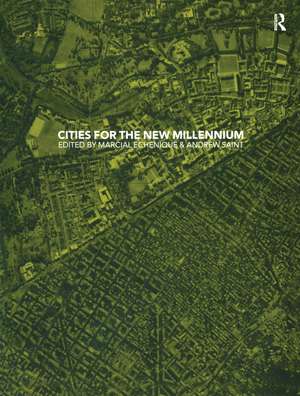Cities for the New Millennium
Editat de Marcial Echenique, Andrew Sainten Limba Engleză Hardback – 21 dec 2016
Preț: 764.20 lei
Preț vechi: 1154.58 lei
-34% Nou
Puncte Express: 1146
Preț estimativ în valută:
146.24€ • 151.82$ • 121.95£
146.24€ • 151.82$ • 121.95£
Carte tipărită la comandă
Livrare economică 24 martie-07 aprilie
Preluare comenzi: 021 569.72.76
Specificații
ISBN-13: 9781138155657
ISBN-10: 1138155659
Pagini: 192
Dimensiuni: 210 x 280 mm
Greutate: 0.45 kg
Ediția:1
Editura: Taylor & Francis
Colecția Routledge
Locul publicării:Oxford, United Kingdom
ISBN-10: 1138155659
Pagini: 192
Dimensiuni: 210 x 280 mm
Greutate: 0.45 kg
Ediția:1
Editura: Taylor & Francis
Colecția Routledge
Locul publicării:Oxford, United Kingdom
Public țintă
Postgraduate, Professional, Professional Practice & Development, and UndergraduateCuprins
Preface. Introduction. 1. Compaction. 'Let's Cram More into the City'. Capitalism and the City. Density Means Better Cities. 2. Dispersal. Mobility and Space in Metropolitan Areas. Densities and Sustainable Cities: The UK Experience. Compactness or Sprawl: America's Future vs. the Present. 3. Regeneration. 'Creating an Urban Splash': Rehabilitation of Central Sites. Imaginative Landscapes out of Industrial Dereliction. The Task of the Urban Planner and Architect. The Sensuality of Logic and the Logic of Sensuality. Living in the Landscape. 4. Technical Issues. Deltametropolis: An Exercise in Strategic Planning. Infrastructure and Cities. Urban Form and Building Energy. Designing for Disaster: The Urban Future. 5. Lessons from History. Edinburgh. Lessons from London. Extensive or Intensive Development? A Century of Debates and Experience in Moscow.
Recenzii
'The strength of the book is in the quality and diversity of its contributors... The papers present concise and thought-provoking arguments about the multiplicity of problems, conflicts and solutions in modern urban planning from a range of informed viewpoint.' - Environment and Planning A
'This is an interesting collection of papers and is recommended reading for anyone involved in the planning, construction or regeneration of urban areas.' - Regeneration and Renewal
'This is an interesting collection of papers and is recommended reading for anyone involved in the planning, construction or regeneration of urban areas.' - Regeneration and Renewal
'Andrew Saint in a delicious conclusion, reminds us of hte real lessons that London's evolution provides.' - Architectural Review
'For all those engaged in urban renewal and city design, Cities for a New Millennium is a must.' - The Architects' Journal
'The strength of the book is in the quality and diversity of its contributors ... The papers present concise and thought-provoking arguments about the multiplicity of problems, conflicts and solutions in modern urban planning from a range of informed viewpoint.' - Environment and Planning A
'This is a worthly addition to the bookshelf. It provides an expert, interdisciplinary analysis of how to take cities into the millennium and shoud inspire further debate in this complex area.' - Scottish Planning and Environmental Law
A worthwhile collection of papers - Urban Design Quarterly, Summer 2002
'This is an interesting collection of papers and is recommended reading for anyone involved in the planning, construction or regeneration of urban areas.' - Regeneration and Renewal
'This is an interesting collection of papers and is recommended reading for anyone involved in the planning, construction or regeneration of urban areas.' - Regeneration and Renewal
'Andrew Saint in a delicious conclusion, reminds us of hte real lessons that London's evolution provides.' - Architectural Review
'For all those engaged in urban renewal and city design, Cities for a New Millennium is a must.' - The Architects' Journal
'The strength of the book is in the quality and diversity of its contributors ... The papers present concise and thought-provoking arguments about the multiplicity of problems, conflicts and solutions in modern urban planning from a range of informed viewpoint.' - Environment and Planning A
'This is a worthly addition to the bookshelf. It provides an expert, interdisciplinary analysis of how to take cities into the millennium and shoud inspire further debate in this complex area.' - Scottish Planning and Environmental Law
A worthwhile collection of papers - Urban Design Quarterly, Summer 2002
Notă biografică
Marcial Echenique, Andrew Saint
Descriere
This book looks at architecture today as a force for regenerating the culture of cities and the possibilities offered by technical progress for improving cities in the light of increasing concern for a sustainable human environment.
